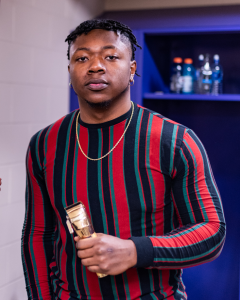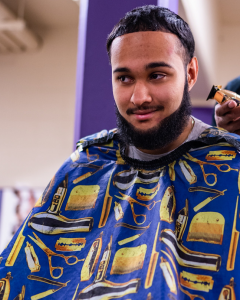 Winona State University’s Inclusion and Diversity Office is making campus feel more like home for students by providing a diverse barber shop experience in the visitor locker room in Memorial Hall.
Winona State University’s Inclusion and Diversity Office is making campus feel more like home for students by providing a diverse barber shop experience in the visitor locker room in Memorial Hall.
What began as a convenient opportunity for young men of color to get a custom cut and style several semesters ago has become a regular offering available to all students who seek a specifically unique hair styling experience and an educational dose of culture. Dr. Jonathan Locust, WSU’s Associate Vice President of Inclusion & Diversity, says he saw the need and came upon a creative way to fill it, “Many times students on our campus who have come from more urban and suburban settings must travel a distance to get haircut needs met, so we decided to bring the culturally rich experience to them.”
WSU Student Davi Flowers agrees, “I am happy there’s a barber available because I can stay in town rather than leaving.” Extremely well received, two professional stylists now regularly travel to WSU and cut hair once every three to four weeks, from 9 a.m. to 4 p.m., for a cost of twenty dollars.
Historically, the profession of barbering became one of the first independent and lucrative careers for men of color after the Emancipation, a trade passed down from grandfather to father to son to grandson.
In a black barbershop, Locust explains, wisdom is handed down through the generations. Being brought by a parent or grandparent to the shop for the first time on a busy Saturday is a rite of passage, an experience that the men in the family experience together as part of the community at large. WSU students Chris Edwards, Maurice Hudson, and Brison White wholeheartedly agree, clearly recalling their own first visits. Although scared at first of the “stranger” working with their hair and using loud tools, their barbers quickly became part of the weekly fabric of their lives, an extended family member who knew of their struggles, gave wise advice, and continues to be invited to all of their family celebrations as well as times of tragedy. They cannot imagine their lives without them.
The Winona State students reiterate that going to the barbershop is much more than getting a precision cut and style. It’s about community, about a sort of therapy, a safe place to just be together as neighbors and friends. Sometimes, they said, people just enter the barbershop to sit down and visit with others, never actually getting their hair cut at all.
 All of the men waiting in the WSU Barbershop line or in the chair agreed that in black families they “are taught to hold ‘men mentalities’, to not immediately open up but stay guarded in what you say or do.” However, in a culturally competent barbershop, explains journalism major Maurice Hudson, they feel “a safety net in place, with no need to break the ice but instead be able to just enjoy conversation,” or “chop it up” with everyone around them.
All of the men waiting in the WSU Barbershop line or in the chair agreed that in black families they “are taught to hold ‘men mentalities’, to not immediately open up but stay guarded in what you say or do.” However, in a culturally competent barbershop, explains journalism major Maurice Hudson, they feel “a safety net in place, with no need to break the ice but instead be able to just enjoy conversation,” or “chop it up” with everyone around them.
Student clients are thankful to Dr. Locust for making this opportunity possible. Usually having to drive to Rochester or the Twin Cities for their styling needs, students love the convenience of campus access and also time with a barber they have come to trust. Brison White, a criminal justice and corrections major, explains that an expert hair cut in the chair of a long-term barber is “part of someone’s image, directly connected to confidence, and really a part of culture, a boost to your week, a way of life.”
 Journalism major Chris Edwards encourages WSU students of all cultures and backgrounds to take part in the black barbershop experience, to even just stop in during the day to join in the community event, meet “a barber who will remember your name and ask about your family” the next time he sees you. Edwards fondly remembers time spent in his childhood barbershop listening in awe at “the talking, laughing, screaming, arguing, and constant conversation.” Although admittedly shy, he knew he was in a comfort zone of great importance that made a lasting impact on him. He would like to see more WSU students take part in the entire barbershop experience, whether to actually get a haircut and dialogue with the barber himself, or “just have a conversation and chill.”
Journalism major Chris Edwards encourages WSU students of all cultures and backgrounds to take part in the black barbershop experience, to even just stop in during the day to join in the community event, meet “a barber who will remember your name and ask about your family” the next time he sees you. Edwards fondly remembers time spent in his childhood barbershop listening in awe at “the talking, laughing, screaming, arguing, and constant conversation.” Although admittedly shy, he knew he was in a comfort zone of great importance that made a lasting impact on him. He would like to see more WSU students take part in the entire barbershop experience, whether to actually get a haircut and dialogue with the barber himself, or “just have a conversation and chill.”
Walking out of the barbershop with satisfied smiles and shoulders back, the student clients are already looking forward to getting back into the barber shop environment soon, a kind of sanctuary for free-flowing and spirited discussions, and going back out the door with a clean, sharp look.
